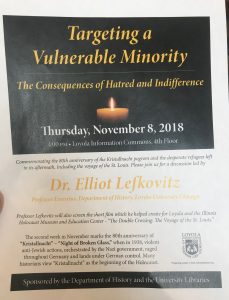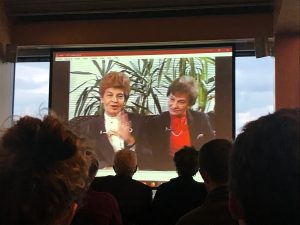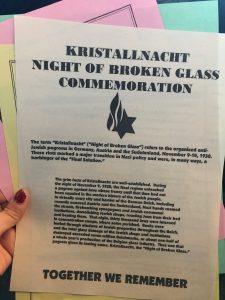Remembering the Kristallnacht at Loyola
To be honest with you, one of my main hesitations about going to Loyola at first was that it’s a Jesuit university, and I’m not religious. But it’s been really great, these past four years, to see that Loyola is not just a Catholic university but one that thinks about the diversity of its students. I heard recently, although I don’t know if it’s true, that Loyola University Chicago is both the most diverse Jesuit institution and that a majority of our students are Hindu. Nevertheless, it’s the persistent idea.
The reason I’m writing about this is because I recently went to an event commemorating the Kristallnacht, the Night of Shattered Glass on November 9-10, 1938, in Germany and Austria.
Being a history major and that it was sponsored in part by the History department, I was reminded again and again to go – but I would have gone anyway. It was not a religious event, but it took into consideration the different religions and identities that Loyola students have even just to put on this kind of event. It’s like including the menorah in stereotypical holiday designs out there, next to Christmas trees and Santa hats and (although it seems like it’s getting rarer) saying “Joyous Kwanzaa” … Even though I don’t identify as a member of the group, I think inclusion is always good.
Dr. Elliot Lefkovitz was a really impressive speaker. It was heartbreaking to be there on the day that another mass murder was committed in the United States, and he read a letter from someone who had grown up in the Pittsburgh community where the Tree of Life Synagogue is, as well as a moving memorial of the lives lost. He especially emphasized that atrocities such as the Tree of Life killings and the Holocaust were killed themselves in abstractions: in learning that six million died in those short years of World War II rather than one plus one plus one plus one… and so on, and the same too at the level of eleven dead.
After speaking for a while, he played a short film he had made almost thirty years ago called ‘The Double Crossing’, interviews of refugees from Germany in 1939 who went to Cuba for safety but most were returned to the European mainland, over 200 of which were to die in the following years.
I was really amazed by it. I think one of the things that so drives me about history is the human experience of it all, and interviews like these, preserved memories of people who now have mostly passed away, are incredible. After the film ended, Dr. Lefkovitz read some quotes from Eli Weisel about the damage that indifference does in conclusion and answered some questions that had come up about the short film.
As always, I’m amazed by the variety of events you can find and go to at Loyola, and each one of them are exposure to unique things that I am so, so grateful I get to experience and learn about in my college years. When/if you tour here, you’re probably going to see posters for things you want to go to and clubs you want to join as well! When I applied to Northwestern University after touring it, my application letter was all about how I wanted to be involved in the different clubs and events I had seen on posters around the campus (although now of course! of course! I’m so glad I went here instead).
No matter where you end up, don’t be afraid to get out there and go to things. You’ll learn so much beyond the classroom!


